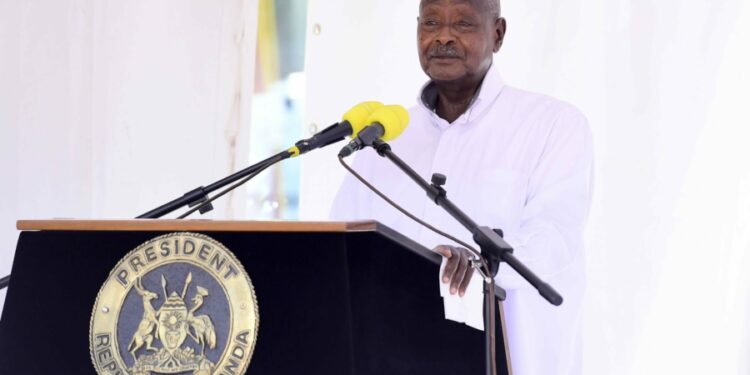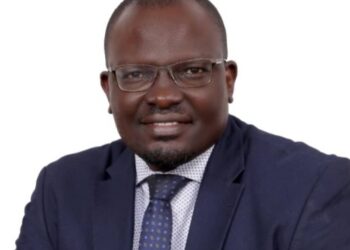President Yoweri Kaguta Museveni has revealed that Uganda has registered a substantial growth in the economy ever since the National Resistance Movement (NRM) Government came to power in 1986.
“When the NRM Government took over in 1986, the economy depended on a few cash crops namely: coffee, cotton, tea and tobacco. Since then, the economy has become bigger and diversified. Some of the agricultural produce which were only for consumption at home such as maize, beans, matooke, fish, milk, etc., have become commercial, contributing to household incomes. Other crops that have joined the traditional cash crops include: sunflower, from which we now make edible oil, palm oil trees, vanilla, avocado, oranges and mangoes, which are raw materials for the agro-processing plants,” President Museveni said.
The President made the remarks today while delivering his State of Nation Address held at Kololo Independence Grounds. He was accompanied by the First Lady Mama Janet Museveni who is also the Minister of Education & Sports.
H.E the President added that as a country, Uganda now has a vibrant workforce that is transforming the economy into a digital one.
“There are many businesses and financial transactions taking place within the Country, using the internet and other online avenues. This is not only improving efficiency, but also creating many jobs for the youth,” he said, adding, “We now produce enough sugar (in fact we now have surplus sugar which we are exporting to our neighbours), steel products, cement, other building materials such as tiles at Kapeeka Industrial Park, mineral extraction and beneficiation, etc. We shall soon produce oil and gas and the infrastructure development to enable this is currently under construction, including the EACOP, power and water infrastructure and Kabaale International Airport.”
On Uganda’s Fiscal performance, the President highlighted that in the next Financial Year 2023/2024, the government is planning to collect UShs. 29.67 trillion as domestic revenue, away from the UShs. 25.55 trillion that was estimated to be collected in this current Financial Year.
“Through our strategy to raise revenue, the Government is planning to raise at least 18 percent of GDP in the next five years.”
He said once the government achieves that target, the country shall be able to reduce its reliance on borrowing to finance a larger share of its budget.
“We must avoid this problem of not being able to pay our debt by increasing what we collect from taxes and other sources of domestic revenue such as royalties from our mineral development. Some countries are paying more than 50% of their collections in taxes to service debts. We should avoid falling into this debt trap. Therefore, in addition to collecting more revenue domestically, we should also not spend what we do not have. To achieve this, the Government decided to rationalize Government departments to reduce duplications and wastage of taxpayer’s money and the Ministry of Public Service is finalizing the implementation plan for this decision,” H.E Museveni noted.
President Museveni also boasted that Uganda’s industrialization drive is bearing fruit, with many factories being set up.
He said so far the country has eight government owned industrial parks which are currently operational with a total capital investment within the industrial parks so far standing at US$ 2.93 billion and 98,263 direct jobs created with many more indirect jobs.
“In total, 226 factories are operating within the industrial parks while 303 factories are either under construction or the planning stage. The development of industrial parks is one of the vehicles for socio-economic transformation, with the projected creation of 2.5 million jobs in the next five years,” he stated.
“The factories in the Industrial Parks do not include the stand-alone- factories owned and operated by many different investors. These are factories that belong to the Mukwano and Mulwana Group, etc. These are a total of 354 factories employing an additional 101,000 people. The total number of factories in Uganda is 4,008, with a total number of employees of 150,685,” he added.
President Museveni further reiterated the government’s commitment to create wealth and jobs for Ugandans by moving households from the non-money economy to the money economy, through the Parish Development Model (PDM).
“Using this approach, 39% households which are currently in the non-money economy (the majority of whom are in subsistence agriculture), will move into the money economy. The Parish Development Model will increase incomes, improve quality of life and eradicate poverty at household level through modernisation of agriculture, industrialisation, improved services delivery and using modern communication technologies,” he explained.
“Government has committed UShs. 1,059 Billion this financial year, for its rollout countrywide. So far, Parishes which established SACCOs have received UShs. 50 million each, benefiting 906 SACCOs and more than 21,082 individual beneficiaries. Government will deepen the implementation of the Parish Development Model (PDM), beyond the Financial Inclusion pillar by maintaining disbursement of UShs. 100 million per parish next financial year and in the subsequent years.”
The President also revealed that the Emyooga initiative has been successful in mobilizing the youth and women in the informal sector into productive self-employment by increasing their skills, acquiring equipment and accessing affordable capital.
“As of end December, 2022, seed capital amounting to UShs. 258.24 billion had been disbursed, benefitting 6714 Emyooga SACCOs and covering 1,858,762 individual beneficiaries. Whatever mistakes that occur in these low interest, poor-people funding efforts, are correctable and are detectable, if you liaise with the public in your areas like I have been doing with the public barazas in my recent trips up-country.”
Regarding the fight against corruption and improving accountability of institutions, the President said priority will be given to ensuring transparency, accountability and anti-corruption measures across government systems by implementation of Electronic Government in especially procurement, health, education and taxation
“Fast tracking and monitoring the effective implementation of government programs; strengthening the courts and case management systems through adequate staffing and digitization; and implementation of other covert and overt efforts in the fight against corruption.”
On the recently signed Anti- Homosexuality law, President Museveni clarified that the law is only meant to punish homosexuals who go from merely being and starts recruiting other people who are not psychologically disoriented like him or her to be like him by misinforming or bribing among others. He explained that the law does not catch up with those homosexuals who are victims of psychological disorientation and in one way or the other need assistance to, if possible, overcome the vice.
“The one who recruits, there, he becomes a criminal and, if convicted, goes to prison for a period not exceeding 20 years. If he goes further and rapes a person (child, indigent, etc.), he commits a capital offence and he faces a maximum sentence of death,” he said.
Do you have a story in your community or an opinion to share with us: Email us at editorial@watchdoguganda.com













